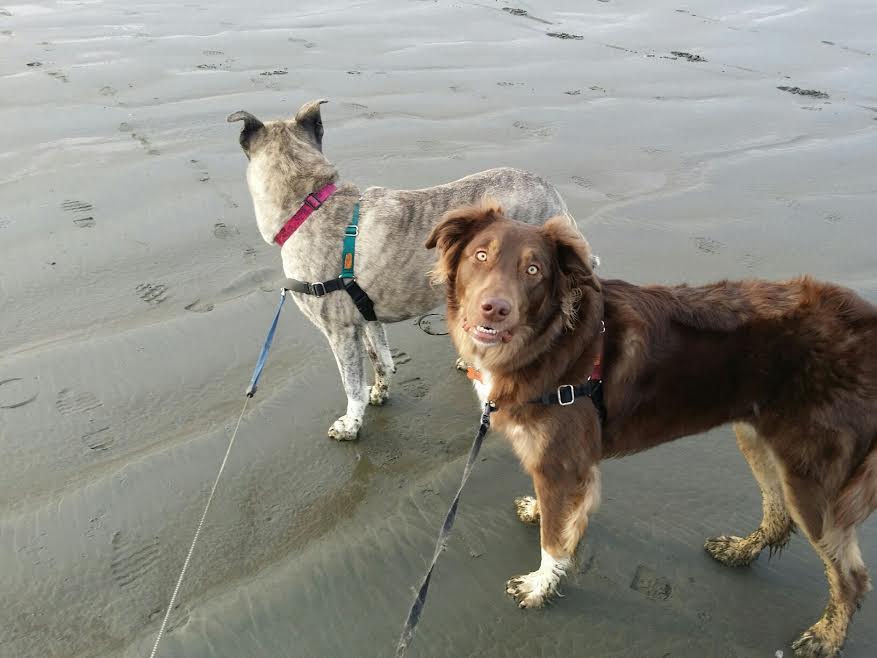- Not a substitute for professional veterinary help.
When we first adopted Ahma, she was a happy, energetic puppy with no apparent health problems. That’s why her eventual diagnosis came as such a surprise.
We adopted Ahma a year ago from a very nice family with three young boys; they were being deployed to Germany and couldn’t take the dog. Their grandmother had brought Ahma home to them one day because she thought they needed a puppy. Grandma had seen someone selling puppies out of the back of a truck on the side of a road, stopped, and picked up Ahma.
The family had Scandinavian roots, so the three young boys chose Ahma’s name because it’s the Finnish word for wolverine (or at least, that’s what they told us!). When Ahma came home with us, she was 6 months old and a crazy bundle of energy. She immediately bonded with us and our dog Sequoia. They are the complete definition of sisters.
Ahma is a combination of Australian shepherd, chocolate lab, and a lot of fetch-obsessed energy.
Ahma is a combination of Australian shepherd, chocolate lab, and a lot of fetch-obsessed energy. When she first joined our family, she had a mix of issues we had to find ways to deal with. She would eat her entire meal in two bites, with maybe a total of five seconds before it was gone. We ended up having to feed her on a spill mat for the first six months in order to get her to slow down when she was eating. She’s still very, very possessive of food, toys, and treats, so we have to be watchful around other dogs when she’s eating or has a bone. And most noticeable of all, she is ball-obsessed—and I don’t say this lightly. If she has a ball, nothing else in the world exists. She doesn’t listen to any commands, she doesn’t care about anything else, and she’s extremely insistent that you throw that ball.
About two months ago, we had a spate of unseasonably warm weather, so after I got home from work I went into the back garden with my book to relax. Once I lied down in the grass, Ahma made a very odd noise and flopped down against me. It didn’t sound like she was in pain; it was more of a combination of pain and fear at the same time. Now, Ahma can be dramatic, especially when she wants food, so I wasn’t immediately concerned.
It didn’t sound like she was in pain; it was more of a combination of pain and fear at the same time.
I looked back at her, and something about the way she was lying there tipped me off to a problem. I got up and started patting her and calling her name. She wasn’t responsive, which was very odd. Her legs were stiff and her eyes were glazed. I started to get worried, because Ahma cannot sit or stand still—she just doesn’t. I was really afraid that something was wrong. Ahma and I went inside, and I called my fiancé to let him know that something wasn’t right. By the time Jonny arrived about 10 minutes later, Ahma was up and back to her normal self.
After I settled down from that episode, I convinced myself that nothing was wrong. Two days later, we were driving home from visiting Jonny’s parents, who live a little over an hour away. Less than a mile from home, Ahma, who had been quiet the whole trip (a bit of a miracle), started getting very restless. She was trying to get into the front seats of the car and climb into our laps. Jonny noticed that she was drooling a lot. Within a minute or two, Ahma cried out again in that same scared/pained tone and collapsed in the back seat. This was the exact same behaviour that she had shown a few days before.
Within a minute or two, Ahma cried out again in that same scared/pained tone and collapsed in the back seat.
I stopped the car, and we checked Ahma out in the back seat to try and figure out what was happening. We wondered if she had an injury that we’d simply missed. She was unresponsive, with her limbs rigid and her gaze unfocused. It was about 9 pm on Sunday, so the emergency vet was going to be our only option. We made the decision to go home, as we lived right around the corner. Once we arrived, Ahma got out of the car and came in, but there was something very off about her. She’s always exuberant and so energetic that she wiggles constantly. Instead, she was acting withdrawn, her eyes remained glazed, and she just stood in one place and stared. She was breathing rapidly for long periods of time while not moving, didn’t want to play, and didn’t care about balls or food. This wasn’t Ahma. I was so concerned about her behaviour that I kept her right next to us.
After some Googling, we figured out that Ahma had had a seizure. We kept a close eye on her for the rest of the night and decided that if things got any worse, we’d rush her to the emergency vet. Otherwise, I planned to take her to our regular vet first thing in the morning.
Everything progressed just fine through the night, thankfully. That morning I took Ahma to our vet, who kept her for the day for bloodwork and other tests. It should have only have taken a few minutes, but with Ahma’s quirks, they had to give her anesthesia to get the tests done.
There were three main possible culprits: Ahma could have eaten something poisonous, she could have been sick, or she could have had epilepsy, which is more common for Australian shepherds than any other breed.
Epilepsy is more common for Australian shepherds than any other breed.
When I picked her up from the vet later that day, everything seemed to be normal. Ahma was back! The vet said her day was uneventful, and that I should just keep an eye on her. I was supposed to record any seizures if she had them. They told me that during an episode, we should avoid yelling or making loud noises. It’d be important to keep calm and give her space.
The next day, the vet gave me a call. The bloodwork had come back negative for poison or illness, but they could see all the indicators that she had had a seizure. Based on this, Ahma is epileptic.
Because she isn’t having seizures consistently, or even very often, we’re holding off on seizure medication for now, and Ahma gets to go about life normally.
For now, we’ll take it day by day.
It’s been four months since this happened, and Ahma has only had one other seizure that we know of. It happened in the middle of the night, and she was up and good to go in about 5 minutes. Seizures happen most commonly at night or early in the morning, so they’re easy to miss. Ahma hasn’t had any major episodes, and is her crazy, everyday self. For now, we’ll take it day by day. We’re lucky that this isn’t a frequent occurrence. Things might change as she gets older, and we’ll watch her carefully, but life is pretty good right now.
Further reading
- 7 Tips for Living Successfully with an Epileptic Dog
- True Story: My Dog Had Severe Seizures That Changed Our Lives, and She Was Perfect.
Remember, you can count on Rover.com for informative dog content as well as for amazing sitters, many of whom offer dog boarding and walking services!











